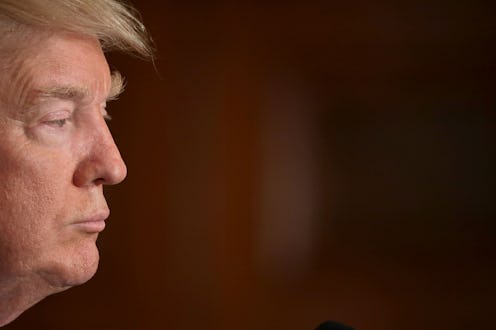News
Trump's Transgender Ban Is A Trap — And Here's Why

On Wednesday morning, President Donald Trump announced a huge shift in American military policy on Twitter, and it landed with an enormous impact. Saying that the top priority of the U.S. armed forces is "decisive and overwhelming victory," Trump said that transgender Americans will no longer be allowed to serve in the military, a reversal from his predecessor's position. Reports that have trickled out since Trump's announcement have raised questions about the motivations behind the move, as well ― namely, whether Trump's transgender military ban is political rather than militarily strategic.
Trump, for his part, claimed on his Twitter account that the decision was made after consultation with "generals and military experts," framing it purely as a matter of strategy and military readiness. He also claimed that allowing transgender soldiers to serve would burden the military with "tremendous medicals costs and disruption," which whether true or not, are claims relating strictly to military decision-making, rather than domestic politics.
But according to Jonathan Swan, a national political reporter for Axios, a Trump administration official told a different story after news of the ban went public. According to this unnamed source ― whose statement is not the White House's official stance, to be clear ― the decision has a decidedly political element, forcing Democrats throughout the Midwest to incorporate transgender rights into their upcoming campaigns.
This forces Democrats in Rust Belt states like Ohio, Michigan, and Wisconsin, to take complete ownership of this issue. How will the blue collar voters in these states respond when senators up for re-election in 2018 like Debbie Stabenow are forced to make their opposition to this a key plank of their campaigns?
The appearance of a political motivation was furthered by reporting calling into question how aware of the decision military higher-ups were before it was announced. Specifically, CNN's Barbara Starr said that the Pentagon was initially out of the loop when the announcement was made, although she did reportedly speak to an official who said Secretary of Defense James Mattis was aware of what was happening.
Back on June 19, Chairman of the Joint Chiefs of Staff Joseph Dunford in the stated in an interview at the National Press Club that there was no ongoing review that would affect whether transgender servicemembers currently serving in the armed forces could continue to serve. This was seemingly contradicted by Trump's blanket statement on Wednesday, which stated that transgender soldiers could not serve "in any capacity."
Transgender personnel are serving right now, and there is no review ongoing that would affect the ability of those currently serving to continue serving, provided they can meet the physical and mental qualifications of service, be worldwide deployable, and meet the standards that every other soldier, sailor, airman, Marine, meets.
As for the official Pentagon response, it's so far directed all questions regarding the policy to the White House, deferring to Trump's decision-making as commander-in-chief. There are currently an estimated 15,000 transgender Americans serving in the U.S. armed forces.